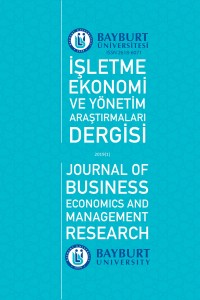Öz
Anahtar Kelimeler
Kaynakça
- 1. Agallija N; Yazici Sinan, Remigration Trends Esenyurt Cinar Quarter Sample, 2017, V. 4, İssue 2, pp. 77-852. Akademia e Shkencave, Fjalori Enciklopedik i Shqipërisë, Tiranë 1985.3. Akademia e Shkencave, Qendra e Studimeve Gjeografike, Ristrukturimi agrar postkomunist në Shqipëri dhe implikimet e tregut të punës, Raport vlerësues-studimor, Tiranë 2005.4. Banka Botërore, Strategjia e zhvillimit rural për Shqipërinë, Tiranë 2002. 5. INSTAT, Migracioni në Shqipëri, 2004.6. INSTAT, Niveli i jetesës dhe pabarazia në Shqipëri, 2004.7. INSTAT, Regjistrimi i Përgjithshëm i Njësive Ekonomike Bujqësore, 1-30 qershor 1998, Tiranë 2001.8. INSTAT, Regjistrimi i Përgjithshëm i Popullsisë dhe Banesave 1989, Tiranë 1991.9. INSTAT, Regjistrimi i Popullsisë dhe Banesave 2001: Njerëzit dhe puna, Shqipëria, Tiranë 2001. Instat 2004. 10. INSTAT, Rezultate paraprake të regjistrimit të popullsisë dhe banesave, Tiranë 2001.11. INSTAT, Tregu i Punës 2004, Tiranë 2004.12. Laçi, S., Gjeografia Rurale, “Fan Noli”, Tiranë 1998.13. Lulzim Hana; Ilia Telo, Tranzicioni në Shqipëri, Arritje dhe Sfida, Tiranë 2005.14. SEDA, UNDP, Raporti i zhvillimit njerëzor për Shqipërinë. Politikat dhe zhvillimi në dobi të të varfërve e të grave në Shqipëri, Tiranë 2005.15. Sinani. A. Disertacion: Organizimi hapësinor, rregullimi rural dhe perspektivat e zhvillimit të qendrueshëm në qarkun e Gjirokastrës, Tiranë 2009. 16. Vlerësim i përbashkët për vendin, Shqipëria, Tiranë 2002.17. Yazıcı. S; Migration Trends in The Cities:The Sample Of Bayburt’s Aydintepe District, Social Sciences Studies Journal, 2017 Vol 3 İssue 2 pp.97-109
Öz
The article aims to
draw the attention of central and local government authorities to certain
problems of rural labor market development in Albania, its impacts on
socio-economic and environmental processes, opportunities and perspectives for
sustainable development etc. Since
1990, Albania has experienced a profound revolution related to the political
regime, administrative institutions and international relations. One of the
most involved aspects in these movements was the labor market. After 1990 there
were such events as: abandonment of suburbs, especially of far mountainous
areas, high hilly territories; desertification of the physical environment as
well as increased human pressure to migrate to the urban and suburban areas of
the country. This “fierce” urbanization emerged thanks to the free movement of
the population and the opportunity to choose freely the settlement. The industry
was paralyzed and most of the facilities were closed, causing mass unemployment
and degradation of some cities and industrial zones and a massive rural exodus.
Over the last three decades there is evidence of a significant increase in “underground
agrarian” unemployment. Agricultural uses of rural areas have left the country
for non-agricultural use. Both agriculture and the environment are most the
most vulnerable elements
which create conflicts in the land sales
market and sharp property problems. The study is focused on the rural market,
as a very sensitive market where they find the fullest expression of
postcommunist processes of nearly three decades
Anahtar Kelimeler
Kaynakça
- 1. Agallija N; Yazici Sinan, Remigration Trends Esenyurt Cinar Quarter Sample, 2017, V. 4, İssue 2, pp. 77-852. Akademia e Shkencave, Fjalori Enciklopedik i Shqipërisë, Tiranë 1985.3. Akademia e Shkencave, Qendra e Studimeve Gjeografike, Ristrukturimi agrar postkomunist në Shqipëri dhe implikimet e tregut të punës, Raport vlerësues-studimor, Tiranë 2005.4. Banka Botërore, Strategjia e zhvillimit rural për Shqipërinë, Tiranë 2002. 5. INSTAT, Migracioni në Shqipëri, 2004.6. INSTAT, Niveli i jetesës dhe pabarazia në Shqipëri, 2004.7. INSTAT, Regjistrimi i Përgjithshëm i Njësive Ekonomike Bujqësore, 1-30 qershor 1998, Tiranë 2001.8. INSTAT, Regjistrimi i Përgjithshëm i Popullsisë dhe Banesave 1989, Tiranë 1991.9. INSTAT, Regjistrimi i Popullsisë dhe Banesave 2001: Njerëzit dhe puna, Shqipëria, Tiranë 2001. Instat 2004. 10. INSTAT, Rezultate paraprake të regjistrimit të popullsisë dhe banesave, Tiranë 2001.11. INSTAT, Tregu i Punës 2004, Tiranë 2004.12. Laçi, S., Gjeografia Rurale, “Fan Noli”, Tiranë 1998.13. Lulzim Hana; Ilia Telo, Tranzicioni në Shqipëri, Arritje dhe Sfida, Tiranë 2005.14. SEDA, UNDP, Raporti i zhvillimit njerëzor për Shqipërinë. Politikat dhe zhvillimi në dobi të të varfërve e të grave në Shqipëri, Tiranë 2005.15. Sinani. A. Disertacion: Organizimi hapësinor, rregullimi rural dhe perspektivat e zhvillimit të qendrueshëm në qarkun e Gjirokastrës, Tiranë 2009. 16. Vlerësim i përbashkët për vendin, Shqipëria, Tiranë 2002.17. Yazıcı. S; Migration Trends in The Cities:The Sample Of Bayburt’s Aydintepe District, Social Sciences Studies Journal, 2017 Vol 3 İssue 2 pp.97-109
Ayrıntılar
| Birincil Dil | İngilizce |
|---|---|
| Bölüm | Makaleler |
| Yazarlar | |
| Yayımlanma Tarihi | 7 Ocak 2019 |
| Gönderilme Tarihi | 5 Eylül 2018 |
| Yayımlandığı Sayı | Yıl 2019 Cilt: 2 Sayı: 1 |
İşletme Ekonomi ve Yönetim Araştırmaları Dergisi Creative Commons Atıf 4.0 Uluslararası Lisansı ile lisanslanmıştır.
Dizinler: Index Copernicus, DOAJ, Crossref, CiteFactor, EBSCO, Google Scholar, ASSOS, OJOP, ERIH Plus


